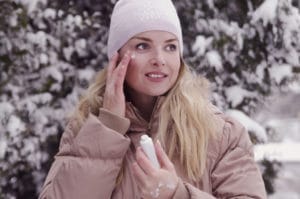
Moisture is King
One of the primary reasons for dry, itchy, cracked skin during the winter is that the air naturally gets drier. A lot drier. When the air is dry, the moisture that is usually held in by the skin’s natural barrier evaporates more quickly. Without adequate moisture, the skin is more susceptible to inflammation and irritation. To offset the dryness in the air, experts recommend using a humidifier. This is helpful because, when it’s chilly, we turn to indoor heat for comfort. That indoor heat pulls moisture out of the environment, which is already lacking. In addition to moisturizing the air, we benefit from drinking extra water during the winter months so we hydrate from the inside out.
Pile on the Right Products
Knowing that the skin’s natural barrier takes a hit in the winter months, we do well to change up our skincare products. Face washes, moisturizers, and body lotions need to be thicker in the wintertime. Products with ceramides, especially, are beneficial because they fortify the maxed-out barrier that usually protects the skin. CeraVe and Cetaphil products are examples of store-bought moisturizers that work like a charm.
Nix the Exfoliating
Usually, we sing the praises of exfoliating services and products. It isn’t that you can’t get an occasional chemical peel or microdermabrasion in the wintertime. You won’t want to be exfoliating every day, though. Again, this comes down to the condition of the skin’s natural barrier and the potential for irritation on parched skin.
Damp Hands Don’t Belong Outdoors
When we wash our hands, which we’re doing more these days, we often rush through the drying process to get on with our day. During the winter, this can be detrimental to the skin. With a diminished barrier, the skin is more prone to chapping. You may notice that your lips get chapped when you lick them while out in the cold weather. This is because the dry air evaporates moisture very quickly, leaving the skin even more in need of moisture. In addition to drying your hands thoroughly before going outdoors, we also recommend using a quality lip balm for the next few months.
Dr. Bucay has several services to help you pamper parched winter skin. Contact our Sonterra or La Casita office today to schedule your visit.